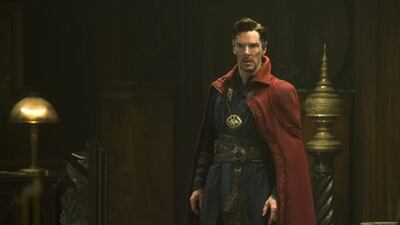Last weekend, Hollywood breathed a sigh of relief. After a fitful and lacklustre year of disappointing releases and expensive failures, it finally racked up a genuine hit.
Doctor Strange, an action-adventure superhero movie from Marvel Studios and Disney, opened worldwide, and raked in an astonishing US$325 million. Even better for the mental and emotional health of the people who live and work in the entertainment industry, most of that haul came from what we in Hollywood call “overseas”.
To Hollywood denizens, foreign territory starts about 10 kilometres out of town. There’s us – with our weird codes of conduct and our vegan lunches and our meditation gurus – and then there’s everybody else. Show business has a distorting effect on a person’s worldview.
So last weekend was confirmation that it’s possible for the guiding figures of Hollywood — the writers, directors, executives – to accurately target a motion picture for worldwide audiences. There’s something comforting about knowing that it’s more than theoretically possible to do that. There’s even something comforting, in a larger sense, in knowing that last weekend a lot of the world was watching the same movie at the same time.
The star of the picture is an English actor called Benedict Cumberbatch. In an earlier Hollywood era, he would have changed his name immediately upon his arrival in town. Benedict Cumberbatch is a complicated, odd-sounding name – it’s a perfect name, in fact, for a character in a movie who is playing a supercilious and dim-witted Englishman. Benedict Cumberbatch would have sat in the smoky office of his first agent, some place on Hollywood Boulevard, and his agent would have waved a cigar at him and said: “Kid, you’re a tall and handsome drink of water but the name is stinko. You need a star’s name! You sound like a butler!”
A few months later, the young Ben Batch, or Ben Cummings, or Ben Batcher – or, more radically, Batch Benjamin – would appear as a second-tier star in a big studio picture, get noticed by the talent-spotting mogul, and would be on his way to superstardom.
He would also, somewhere along the way, lose his English accent.
As it happens, Benedict Cumberbatch, in his starring role in Doctor Strange, does just that. He plays the title role of an American doctor who loses his hands in a car accident, and through a connection with an ancient spiritual healer, gains special powers and saves the world. (There’s more to it than that, of course, but my patience with superhero films is pretty thin.)
The filmmakers apparently believed that such a story about such a man could only believably be told if the man was an American, with an American accent, so Cumberbatch plays the part with his mouth and vocal cords firmly on the “American” setting.
He does a pretty good job of it, actually. British actors doing American voices, and vice versa, is a fraught and perilous choice. The British actors often overdo the American nasal tone, and they bite down hard on the “R” sounds so that every line sounds like a snarl. They also tend to focus on American exclamations – like “awesome” and “no way, dude!” – which always sound odd coming from someone who spends his time onstage at the Royal Shakespeare Company.
American actors usually fare even worse, the absolute nadir being the attempt by the actor Dick van Dyke, years ago, to convince audiences he was a cockney chimney sweep in the Disney classic Mary Poppins. His accent was so awkward and forced, such a dismal mess of dropped “H” sounds and shouts of “Cor blimey!”, that it’s hard not to classify it as an act of almost military aggression between two countries.
Hugh Laurie, in his performance as the (American, of course) Dr House on the smash-hit American television series House, did a flawless American accent. Cumberbatch is nearly as flawless, though he does admit to some trouble with the American pronunciation of one word.
The word “sorcerer”, apparently, with its multiple “R” sounds and closed-up vowels, gave him some serious trouble. The British style is to open up that last R, something like: “Saucer-uh.” The American style is to clamp down hard: “Sore-sir-er.” If you watch the movie, keep your ears tuned to that final R sound and watch Benedict Cumberbatch wrap his English mouth around those American syllables.
What’s odd, of course, is that back during the golden age of Hollywood, many American actors spoke with unabashedly English accents. Cary Grant, born in the UK, didn’t even try to Americanise his R’s. The Barrymores, Lionel and John, spoke in plummy mid-Atlantic tones in almost every picture they made. Back when American movies were made primarily for American audiences – decades before the era of global blockbusters like Doctor Strange – a lot of actors sounded vaguely English. Now, when movies open worldwide on the same weekend and the “overseas” market is bigger than the American one, we ask Benedict Cumberbatch to pronounce every R.
And we don’t ask him to change his name. Doesn’t seem like the right trade. I still think Batch Benjamin is a snappier name.
Rob Long is a writer and producer in Los Angeles
On Twitter: @rcbl

